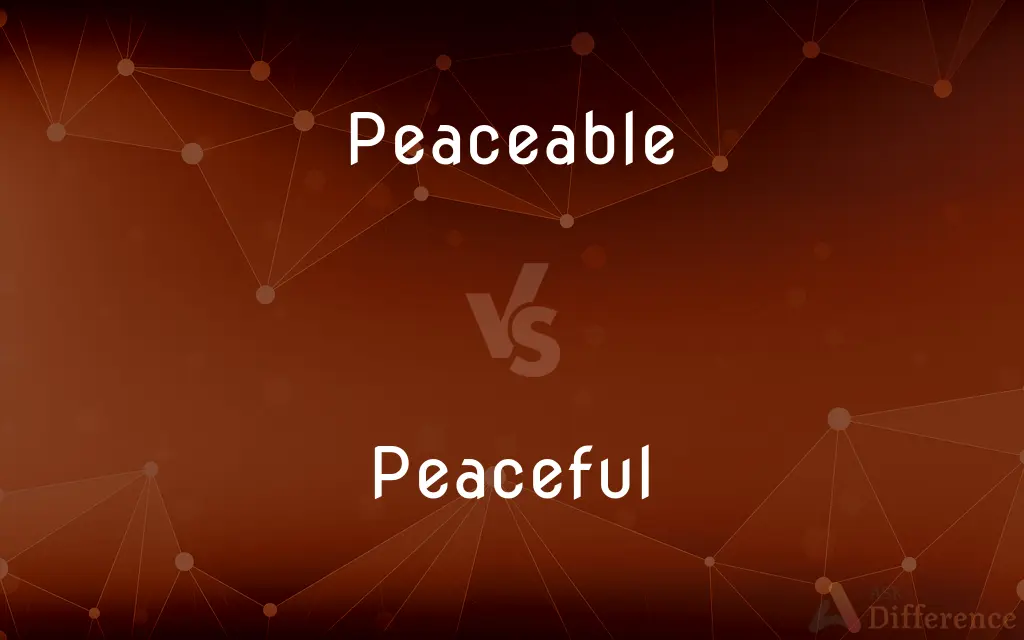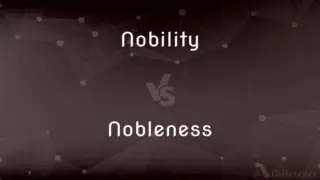Peaceable vs. Peaceful — What's the Difference?
By Tayyaba Rehman & Maham Liaqat — Updated on April 25, 2024
Peaceable emphasizes an active or passive inclination towards avoiding conflict, while peaceful refers to a state of tranquility or absence of disturbance.

Difference Between Peaceable and Peaceful
Table of Contents
ADVERTISEMENT
Key Differences
Peaceable often describes behavior or dispositions inclined towards avoiding conflict or maintaining harmony in interactions. For example, a peaceable negotiation between parties seeks to find common ground without resorting to disagreement or strife. Peaceful, on the other hand, refers to a serene, tranquil state free from disturbance or agitation. This can apply to environments, like a peaceful garden, where calm and quiet prevail, offering a sense of relaxation and calmness.
While peaceable actions or characteristics might be adopted to prevent or resolve conflicts, creating a peaceful environment or situation often results from such efforts. A peaceable assembly aims to protest or gather without causing disruption, thereby maintaining public order and serenity. Conversely, a peaceful setting doesn't necessarily require active efforts to avoid conflict but exists inherently or as a result of prevailing conditions.
A peaceful morning in the countryside naturally occurs, often untouched by human intervention to maintain its tranquility. Thus, while peaceable might refer more to the intent or methods of ensuring harmony and avoiding conflict, peaceful describes the resultant state or environment characterized by calm and tranquility.
Comparison Chart
Focus
Avoiding conflict and maintaining harmony
Presence of tranquility and absence of disturbance
Usage in Context
Behavior, dispositions, actions
Environments, situations, states
ADVERTISEMENT
Implication
Active or passive inclination towards peace
Inherent or resulting condition of calm
Nature
Often requires effort or intent
Can exist inherently or as a result
Common in
Descriptions of negotiations, assemblies, people
Descriptions of settings, moods, environments
Compare with Definitions
Peaceable
Disposed towards harmony.
Her peaceable nature made her a great mediator.
Peaceful
Not involving war or conflict.
The nations enjoyed a long period of peaceful relations.
Peaceable
Inclined to avoid conflict.
The diplomat's peaceable strategies avoided war.
Peaceful
Tranquil, serene.
He looked for a peaceful place to meditate.
Peaceable
Non-aggressive.
Despite provocations, the protesters remained peaceable.
Peaceful
Reflecting peace.
The peaceful expression on her face was comforting.
Peaceable
Harmonious.
They enjoyed a peaceable coexistence with their neighbors.
Peaceful
Free from disturbance.
The lake was peaceful in the early morning.
Peaceable
Designed to maintain peace.
The agreement was a peaceable resolution to the dispute.
Peaceful
Calm, quiet.
After the kids left for school, the house was peaceful again.
Peaceable
Inclined or disposed to peace; promoting calm
They met in a peaceable spirit.
Peaceful
Free from disturbance; tranquil
His peaceful mood vanished
Peaceable
Peaceful; undisturbed.
Peaceful
Not involving war or violence
A soldier was shot at an otherwise peaceful demonstration
Peaceable
Favouring peace rather than conflict; not aggressive, tending to avoid violence (of people, actions etc.).
Peaceful
Undisturbed by strife, turmoil, or disagreement; tranquil
A peaceful hike through the forest.
Peaceable
Characterized by peace; peaceful, tranquil.
Peaceful
Inclined or disposed to peace; peaceable
A peaceful solution to the dispute.
Peaceable
Begin in or at peace; tranquil; quiet; free from, or not disposed to, war, disorder, or excitement; not quarrelsome.
Peaceful
Not involving violence or employing force
A peaceful protest.
Peaceable
Inclined or disposed to peace;
They met in a peaceable spirit
Peace-loving citizens
Peaceful
Not at war; not disturbed by strife or turmoil.
Peaceful protest
Peaceable
Disposed to peace or of a peaceful nature;
The pacific temper seeks to settle disputes on grounds of justice rather than by force
A quiet and peaceable person
In a peaceable and orderly manner
Peaceful
Inclined to peace.
Peaceful
Motionless and calm.
Peaceful
A Muslim; especially a violent member of a radical Islamist group.
Peaceful
Possessing or enjoying peace; not disturbed by war, tumult, agitation, anxiety, or commotion; quiet; tranquil; as, a peaceful time; a peaceful country; a peaceful end.
Peaceful
Not disposed or tending to war, tumult or agitation; pacific; mild; calm; peaceable; as, peaceful words.
Peaceful
Not disturbed by strife or turmoil or war;
A peaceful nation
Peaceful times
A far from peaceful Christmas
Peaceful sleep
Peaceful
Peacefully resistant in response to injustice;
Passive resistance
Peaceful
(of groups) not violent or disorderly;
The right of peaceful assembly
Common Curiosities
Can a peaceable disposition lead to a peaceful life?
Yes, a peaceable disposition can contribute significantly to leading a peaceful life by minimizing conflicts and fostering harmonious relationships.
How do peaceable actions contribute to peace?
Peaceable actions, through efforts to avoid conflict and promote harmony, can lead to the establishment or maintenance of peace.
Can a situation be both peaceable and peaceful?
Yes, a situation can be both peaceable and peaceful if it is characterized by efforts to avoid conflict and is tranquil.
What is the significance of a peaceful setting in stress reduction?
Peaceful settings can significantly reduce stress by providing a tranquil environment that promotes relaxation and calmness.
What defines a peaceable person?
A peaceable person is inclined to avoid conflict and seeks harmony in interactions.
Is a peaceful environment always the result of peaceable actions?
Not always; a peaceful environment can exist naturally or be the result of deliberate peaceable actions.
What role does education play in fostering a peaceable attitude?
Education can play a crucial role in fostering a peaceable attitude by teaching conflict resolution, empathy, and respect for others.
Is it possible to describe an environment as peaceable?
Typically, "peaceable" is used more for behaviors and dispositions, while environments are more often described as peaceful.
How does one transition from a peaceable strategy to ensuring a peaceful outcome?
Transitioning from a peaceable strategy to a peaceful outcome involves effective communication, mutual respect, and the implementation of agreements that satisfy all parties involved.
Do peaceable and peaceful mean the same in legal contexts?
In legal contexts, "peaceable" often refers to actions or behaviors not disturbing the peace, while "peaceful" might not be as commonly used.
Are peaceable solutions always peaceful?
Peaceable solutions aim for peace, but the process may involve addressing underlying tensions which may not always feel peaceful.
How do peaceable negotiations differ from other types of negotiations?
Peaceable negotiations specifically aim to resolve disputes through understanding and agreement, avoiding aggression.
Can a person be naturally peaceable, or is it learned?
While some individuals may have a natural inclination towards peaceableness, it can also be cultivated through experiences and conscious effort.
Can a peaceful protest still be considered peaceable?
Yes, a peaceful protest can be considered peaceable if it actively seeks to avoid conflict and maintain harmony.
How does one promote peaceable interactions in a contentious environment?
Promoting peaceable interactions involves encouraging understanding, respect, and dialogue to avoid conflict.
Share Your Discovery

Previous Comparison
Ruler vs. Scribble
Next Comparison
Nobility vs. NoblenessAuthor Spotlight
Written by
Tayyaba RehmanTayyaba Rehman is a distinguished writer, currently serving as a primary contributor to askdifference.com. As a researcher in semantics and etymology, Tayyaba's passion for the complexity of languages and their distinctions has found a perfect home on the platform. Tayyaba delves into the intricacies of language, distinguishing between commonly confused words and phrases, thereby providing clarity for readers worldwide.
Co-written by
Maham Liaqat















































